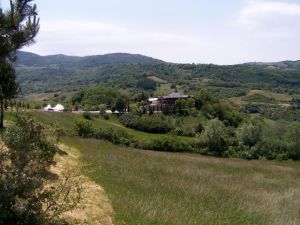 I’ve spent the past three weeks translating Tibetan with a small and wonderful group of people from all over the world at Merigar, near Monte Amiata in Tuscany. Under the guidance of Fabian Sanders and the sponsorship of the Shang Shung Institute, we’ve been struggling with this marvelously ambiguous and context-based language. Between difficult-to-decipher printings, flexible grammatical conventions, and wild Mahasiddha adventures, it’s often possible to construe multiple meanings from a single phrase.
I’ve spent the past three weeks translating Tibetan with a small and wonderful group of people from all over the world at Merigar, near Monte Amiata in Tuscany. Under the guidance of Fabian Sanders and the sponsorship of the Shang Shung Institute, we’ve been struggling with this marvelously ambiguous and context-based language. Between difficult-to-decipher printings, flexible grammatical conventions, and wild Mahasiddha adventures, it’s often possible to construe multiple meanings from a single phrase.
This was the second year we gathered in Merigar, a meeting place of the Dzogchen Community, and home base for Chogyal Namkhai Norbu Rinpoche in Italy. Our training is under the auspices of the Shang Shung International Institute for Tibetan Studies, also founded by Namkhai Norbu.
The text we’re translating was written by Taranatha (1575-1634), a Tibetan of the Jonang lineage, whose Indian teacher told him tales of the extraordinary behaviors and accomplishments of Indian Mahasiddhas of seven transmissions.
Teamwork is the key that makes it possible for us to accomplish anything. Individually, we can arrange the syllables on the page into a variety of meanings. And that’s actually how we begin each day, working individually at our computers with multiple dictionaries and tools. After a few hours, we come together to share our attempts at sense-making and to watch the pieces fall into place as each person finds a key to the mystery. It’s gratifying to understand a bit more of the story each day, as well as to recognize our own progress and that of our classmates. Each one of us has made strides since last year and I’m looking forward to our continuing work together.


Hi, I know this is really random, but I’m at a dead end. You see, my friend has been searching for the Tibetan translation of the word ‘Inspiration.’ Unfortunately, he couldn’t find it so he came to me figuring I’d know what to do. As he explained it to me, he has only a short amount of time to get the translation and the book stores around here are closed, meaning looking through a dictionary is out of the question right now. If there’s anyway you can help us, I’d greatly appreciate it.
-Bri
Hi Bri,
That’s a more difficult question than you might imagine. Often, there are no direct translations for English words in Tibetan, especially words that define conceptual states of mind that may be conceived differently in the Tibetan world view or in Buddhist philosophy. And the meanings of words depend very much on context as well, so exact matches can be hard to find without knowing the context.
Here are some possibilities for inspiration (written in Wylie transliteration):
mos pa – which relates to devotion, interest, intent
byin rlabs – which is most often translated as blessing, but can also be seen as empowering energy, spiritual sustenance, or grace
smon pa – which is more like aspiration
I don’t know what your friend is looking for, but I hope he enjoys the search.
For future reference, here’s a link for an online English-Tibetan dictionary: http://eng-tib.zanwat.org/ . They don’t have a listing for “inspiration”.
Thank you so much for clarifying that there is not direct translation. We weren’t sure what to think when no online dictionary/translators had a word and there was no explanation for the absence available anywhere. Thank you again!
Too long since I delved in the linguistic material of nearby “nations”, but the question posed is reminiscent of an impression I noticed reading a classicist’s translation of classical Greek, where one’s sensorium and life experiences, though the same at that time as forever human, also provided an intersocietal glimpse of the fixities with which people who were developing organizational ways to interrelate among citystates were encountering gaps in world outlook, and they, too, were people who traveled in the circuits of trade, referencing here the locale at which the medieval Tibetan translation exercise is occurring, viz. ‘modern’ IT. ‘Democracy’, ah, yes, we will call our consensus form of government democracy; but I prune my own vineyards, best possible, given time constraints, and the opportunitities of this season.